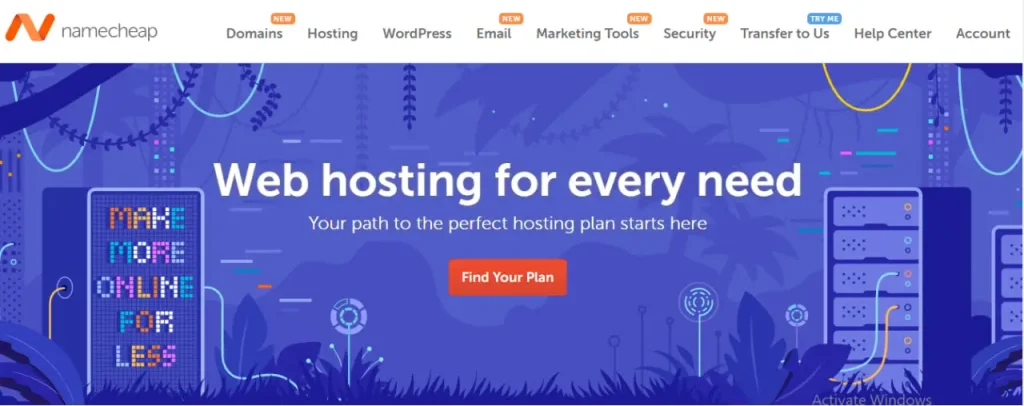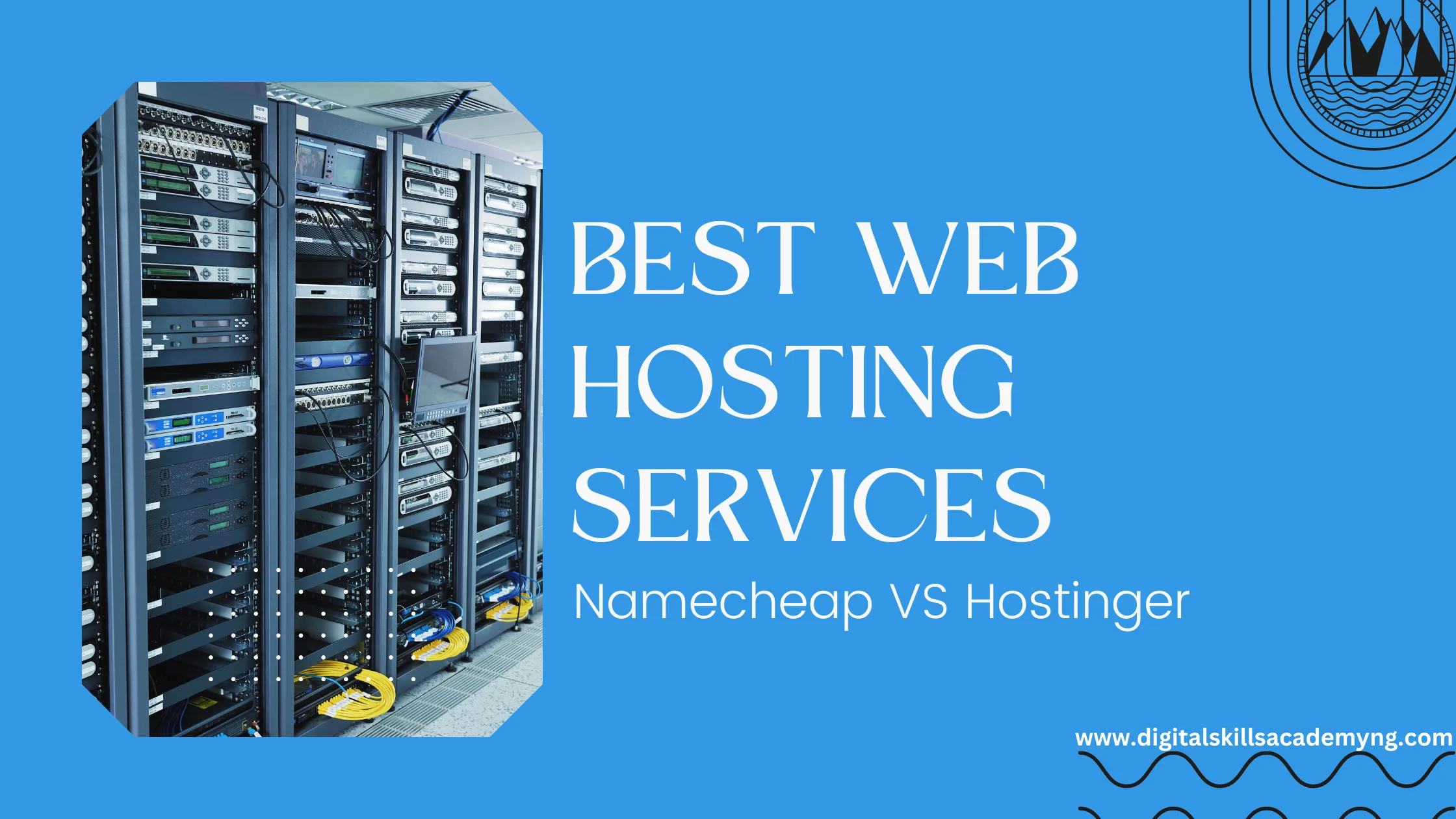Best web hosting platforms for 2024? Website is essential for businesses in this digital era for growth and credibility. A website hosting platform plays a crucial role in building a website. Deciding on what hosting platform to create a quality website can be overwhelming and I have tested a few and came up with these 2 Best Web Hosting Platforms for 2024.
The Best Hosting Platforms for 2024
Table of Contents
NAMECHEAP

Namecheap offers web hosting services, providing individuals and businesses with the tools and infrastructure to host their websites.
Here’s a summary of Namecheap’s web hosting platform, how to use it, its features, benefits for website builders, and what makes it among the best hosting platforms.
Shared Hosting:
Namecheap offers shared hosting plans, where multiple websites share the same server resources. This is a cost-effective option for small to medium-sized websites.
WordPress Hosting:
Namecheap provides optimized hosting for WordPress websites, offering enhanced performance and security features tailored to the WordPress platform.
Reseller Hosting:
Namecheap offers reseller hosting plans for those interested in starting their own web hosting business, allowing users to resell hosting services under their brand.
VPS Hosting:
Virtual Private Server (VPS) hosting provides users with dedicated resources within a virtualized environment, offering more control and scalability than shared hosting.
Dedicated Servers:
Namecheap also offers dedicated server hosting for websites with high traffic and resource-intensive applications, providing full control over server configurations.
How to Use Namecheap Hosting
- Sign Up: Sign up for a hosting plan through the Namecheap website.
- Domain Registration: It can be used to register a domain name, or use an existing domain with their hosting plan.
- Control Panel: Namecheap provides a user-friendly control panel (cPanel) for managing hosting settings, installing applications, managing files, and more.
- Website Creation: Users can build their websites using popular website builders like WordPress, Joomla, or Drupal, or by coding their own HTML, CSS, and JavaScript.
- Support: Namecheap offers customer support via live chat, a ticketing system, and a knowledge base to assist users with technical issues or questions.
Features and Benefits of Namecheap the best web hosting platform for 2024
Affordability: Namecheap offers competitive pricing for its hosting plans, making it accessible to individuals and small businesses on a budget.
Reliability: Namecheap’s hosting infrastructure boasts high uptime guarantees and reliable performance, ensuring websites remain accessible to visitors.
Security: Namecheap provides security features such as SSL certificates, DDoS protection, and regular backups to safeguard websites from cyber threats.
Scalability: Users can easily upgrade their hosting plans as their websites grow, ensuring they have the resources needed to accommodate increased traffic and demand.
Ease of Use: With a user-friendly control panel and one-click installation for popular applications, Namecheap makes it easy for users to manage their hosting accounts and build their websites.
Why is Namecheap one of the best hosting platforms for 2024?
- Affordable Pricing: Namecheap’s hosting plans are known for their affordability without compromising on features or performance.
- Strong Customer Support: Namecheap offers responsive customer support to assist users with any issues or questions they may have.
- User-Friendly Interface: The intuitive control panel and one-click installation make it easy for users to manage their hosting accounts and build their websites, even for beginners.
- Security Focus: Namecheap prioritizes website security, offering various security features and regular updates to protect websites from threats.
- Flexibility: With a range of hosting options available, from shared hosting to dedicated servers, Namecheap caters to the needs of different users, from individuals to businesses with high-traffic websites.
Namecheap’s web hosting platform provides a reliable, affordable, and user-friendly solution for individuals and businesses looking to host their websites with added security and support.
Hostinger is a web hosting company known for its affordable hosting solutions and user-friendly interface.
Here’s a summary of Hostinger, how to register, its features, and what makes it stand out as the best web hosting platform for 2024
Shared Hosting:
Hostinger offers shared hosting plans, where multiple websites share the same server resources. This is a cost-effective option suitable for individuals and small businesses.
Cloud Hosting:
Hostinger provides cloud hosting plans that offer scalable resources and enhanced performance compared to traditional shared hosting.
WordPress Hosting:
Hostinger offers hosting optimized for WordPress websites, including one-click WordPress installation and performance-enhancing features.
VPS Hosting:
Virtual Private Server (VPS) hosting plans provide users with dedicated resources within a virtualized environment, offering more control and scalability compared to “shared hosting”.
Domain Registration:
Hostinger allows users to register domain names through their platform, making it convenient to manage both hosting and domain services in one place.
How to Use Hostinger Hosting:
- Hostinger Website: Go to the Hostinger website and choose a hosting plan that suits your needs.
- Select Domain: If you don’t have a domain already, you can register a new domain through Hostinger or use an existing domain.
- Choose Hosting Plan: Select the hosting plan that best fits your requirements, whether it’s shared hosting, cloud hosting, WordPress hosting, or VPS hosting.
- Sign Up: Fill out the registration form with your details, choose a payment method, and complete the signup process.
- Set Up: Once registered, you can access the Hostinger control panel to set up your hosting account, install applications, manage files, and more.
Hostinger Features:
Affordability:
Hostinger is known for its affordable hosting plans, making it accessible to individuals and small businesses on a budget.
Performance:
Hostinger’s hosting infrastructure is optimized for speed and reliability, ensuring fast loading times and minimal downtime for websites.
User-Friendly Interface:
Hostinger provides a user-friendly control panel (hPanel) that makes it easy for users to manage their hosting accounts, install applications, and configure settings.
Security:
Hostinger offers security features such as SSL certificates, DDoS protection, and regular backups to keep websites secure from cyber threats.
Customer Support:
Hostinger provides customer support via live chat, a ticketing system, and a knowledge base to assist users with any technical issues or questions they may have.
What Makes Hostinger the Best Web Hosting Platform for 2024?
Affordability: Hostinger’s competitive pricing and feature-rich hosting plans make it an attractive option for individuals and businesses looking to host their websites without breaking the bank.
Performance: Hostinger’s optimized hosting infrastructure ensures fast loading times and reliable performance for websites, enhancing user experience and SEO rankings.
Ease of Use: With its user-friendly control panel and one-click installation for popular applications like WordPress, Hostinger makes it easy for users to set up and manage their hosting accounts.
Scalability: Hostinger’s hosting plans are scalable, allowing users to easily upgrade their resources as their websites grow, ensuring they have the resources needed to accommodate increased traffic and demand.
Customer Support: Hostinger’s responsive customer support team is available 24/7 to assist users with any technical issues or questions they may have, ensuring a positive hosting experience.
Hostinger’s combination of affordability, performance, ease of use, scalability, and customer support makes it a popular choice for individuals and businesses looking for reliable web hosting solutions.
Differences between the Namecheap Hosting Platform and Hostinger
Here’s a comparison between Namecheap and Hostinger web hosting services, focusing on their pricing plans, performance, and pros and cons: Learn more
Namecheap Pricing Plans:
Namecheap offers shared hosting, WordPress hosting, reseller hosting, VPS hosting, and dedicated servers.
Shared Hosting plans start at around $1.44/month (with promotional pricing), with options for scalable resources and multiple websites.
Performance:
Namecheap boasts high uptime guarantees and reliable performance.
Offers SSD (Solid State Drive) storage for faster website loading times.
Provides security features such as SSL certificates and DDoS protection.
Pros:
Affordable pricing, especially for shared hosting plans.
User-friendly interface with cPanel control panel.
Strong security features.
Range of hosting options to suit different needs.
Cons:
Renewal rates for hosting plans can be higher after the initial promotional period.
Some users may find customer support response times to be slower compared to other providers.
Hostinger Pricing Plans:
Hostinger offers shared hosting, cloud hosting, WordPress hosting, VPS hosting, and email hosting.
Shared Hosting plans start at around $1.39/month (with promotional pricing), with options for single website hosting and unlimited bandwidth.
Performance:
Hostinger’s hosting infrastructure is optimized for speed and reliability.
Offers SSD storage and LiteSpeed caching for faster website loading times.
Provides free SSL certificates and weekly backups for enhanced security.
Pros:
Extremely affordable pricing, especially for shared hosting plans.
User-friendly interface with hPanel control panel.
Fast loading times and reliable performance.
Responsive customer support is available 24/7.
Cons:
Limited data centers compared to some other providers, which may affect performance for users in certain regions.
Some advanced features may be lacking compared to higher-tier hosting providers.
In Conclusion
Namecheap and Hostinger offer affordable web hosting solutions with reliable performance and user-friendly interfaces. However, there are some differences:
Pricing:
Hostinger offers slightly lower introductory pricing for shared hosting plans, but both providers are competitively priced.
Performance:
Namecheap and Hostinger prioritize performance, with SSD storage, security features, and reliable uptime. Hostinger may have a slight edge in terms of website loading times due to its optimized infrastructure.
Pros and Cons:
Namecheap has a wider range of hosting options, including reseller hosting and dedicated servers, while Hostinger offers extremely affordable pricing and responsive customer support.
Ultimately, the choice between Namecheap and Hostinger depends on your specific needs and priorities, such as budget, desired features, and level of support.
Don’t forget to share with your friends.





